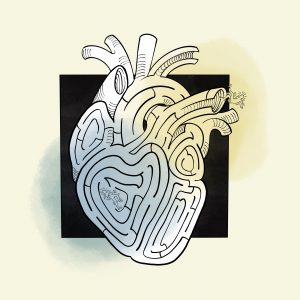
The Way Down Wanderers
Biography
The Way Down Wanderers
More Like Tomorrow
The Way Down Wanderers sing like angels but write songs with guts that are unmistakably earthbound: a soon-to-be dad, excited but scared, fighting for self-growth; someone recovering from alcohol dependency, devoted to healing but with a confession to make––there are no fairytales here. And yet, the music begs an unapologetically Pollyanna question, like a big-hearted dare: Can a song help save you?
“I think when we strive to be the best versions of ourselves, and to accept other people that we don’t understand, that all works toward creating a culture we strive for,” says Collin Krause, one of The Way Down Wanderers’ two lead songwriters and vocalists. “Part of that process really is working on yourself––and self-forgiveness. At the end of the day, we’re not going to be perfect. The idea is to recognize that, and to try to forgive yourself if you can––and to try to move on and make progress.”
Read More
“Right,” adds Austin Krause-Thompson, the band’s other front man and core writer. “And this record does lend itself to some of those messages.”
Austin and Collin are discussing More Like Tomorrow, the Way Down Wanderers’ third full-length release. The project is the anticipated follow-up to their 2019 breakthrough album Illusions, which earned praise from Rolling Stone Country, No Depression, Relix, and more. The band’s gorgeous harmonies and string-band virtuosity still anchor the new album, but the sonic borders the Way Down Wanderers once flirted with crossing have been beautifully breached. Their lyricism has also evolved, giving way to true stories that cut deep. “I think more so on this record than ever, the songs are just more direct, with acute meanings in our own situations,” says Austin. “Each’s song’s story is less broad. I think, at least for me, writing is definitely growing more and more personal.”
With More Like Tomorrow, the five-piece band from Peoria, Illinois, has emerged not just as quirky bluegrass kids with a habit of experimentation, but as confident purveyors of some of the most sophisticated roots-pop anywhere.
“I love it when the song itself dictates the sonic arrangement––the pop sensibilities or Americana we can throw in there,” Collin says. “I think just allowing the song to exist as its own entity is really important.”
Every song on More Like Tomorrow stands alone but works with the group to achieve something bigger––much like the Way Down Wanderers themselves. Collin and Austin met as teenagers––at 15 and 19, respectively. Multi-instrumentalist Austin was drumming in a rock band at the time, while Collin was playing mandolin and fiddle in a bluegrass-leaning folk outfit. The two felt like brothers fast. A few years later, Austin married Collin’s older sister, making the two men who met and connected as boys actual family.
To form the Way Down Wanderers, Collin and Austin welcomed jazz percussionist John Merikoski, classical upright bassist John Williams, and banjo player Travis Kowalsky. The quintet’s years on the road have built a devoted grassroots following, which the band cherishes. Collin points to the connection with audiences as a key cultivator of their latest songwriting. “Having a group that listens and absorbs your music who you can identify with as a community rather than just fans opens us up as writers to feel more comfortable about openly discussing personal things that we’ve been through in a song,” he says.
Album opener “Codeine, Rest, & Loneliness” is a stunning example of what the Way Down Wanderers can do with that comfort. Co-written by Collin and Austin, the song is a breathtaking vocal and instrumental showcase, filled with soaring harmonies, intimate solos, and dizzying strings. Part mournful cry, part joyful tribute, “Codeine, Rest, & Loneliness” was inspired by the loss of two friends who died young. Both of the writers count the song as their favorite on the record.
With piano-pounding, jam-band swagger and a message of interconnectivity and hope, “The Wire” is a singalong just waiting to be shouted back to the stage. Leaning into a scratchy pop-train beat, “Hard Times” points to the rejuvenation made possible in the trenches of tough stuff. With poignant guitar tone that rings out like a bell and tender lead vocals, “Dark Marks” rests easily and gratefully in the comfort of home and love.
Stark bass kicks off “Forever,” a moving meditation on the changes demanded after becoming a parent. “My wife and I recently had a son, and it’s been absolutely amazing, but it’s definitely brought about some of the more stressful situations we’ve been through,” Austin says. “Having kids just shows you parts of yourself that you need to fix. It really shows you what you need to do to be the best person you can be––more so than anything else I’ve found.” Bouncing “Two Parts One Heart” captures fatherhood’s wonder and joy in line after witty line.
A feat of melodic funk, “Hiding” is a warm embrace of self, from expression to acceptance. Full of claps and stomps, jaunty album closer “Everything’s Made of Sand” peddles kindness for kindness’ sake rather than to please a higher power and luxuriating in transience instead of fearing it.
Highlights “Parkside Drive” and “Love is My Gospel” carry the record’s overarching messages of self-accountability and love in different ways. Heart-heavy but determined, “Parkside Drive” relies on vulnerable vocals that swell into a chorus of powerful repetition. Collin wrote the song, a complex dual narrative inspired by true stories. As he documents his own recovery from alcohol dependency, Collin also memorializes a neighbor who sometimes wanted a little more time than Collin wanted to give. Suffering in silence, the neighbor ultimately took his own life. Collin pays tribute, searches for strength, absolves himself, and commits to a better standard in less than three mesmerizing minutes. “I guess I felt a personal responsibility to write the song, and it was a hard song to write. It’s a really emotional song to perform,” he says. “I think it’s some of the most vulnerable lyrics I’ve ever written. I also think it’s crucial to my recovery process. It’s affected the way I treat people or even think of strangers.”
Warm and full, “Love is My Gospel” balances gratitude for love and partnership with the knowledge that everyone doesn’t have it. Praise for love as a guide rolls into musings on inequality and privilege. “I have this idea as a writer that a song doesn’t have to follow one specific message,” Collin says. “I was just realizing how fortunate I am in my life to have a partner I love so much, but then; I was thinking simultaneously about how there is a lot of sorrow in the world. Just being a white person in America––my privilege could be the cause of someone else’s deprivation. That’s something I try to be aware of.” The messages emerge as two sides of the same coin: By trusting love, we are open to empathy––which means we must hold space for sorrow and other’s experiences. The song is masterpiece of writing and performance.
Working in that sweet spot where self-acceptance and rejection of the status-quo collide, the Way Down Wanderers hope listeners can find their own personal applications and understandings of the new songs. “Connection, release, relatability––maybe hope, or confidence, or reassurance,” Austin says. “I hope that people kind of weave these messages into their lives in their own positive way.”
show less
Learn More
Press Releases
Photography
Click thumbnail to open high-res image then right click to save.
Press
WMBD-TV (Peoria, IL) Feature Segment
Rolling Stone Country “The Wire” Premiere
The Boot “Codeine Rest & Loneliness” Premiere
The Bluegrass Situation “Everything’s Made Out of Sand” Premiere
Roots, Rednecks and Radicals Podcast Interview
Jrodconcerts: The Podcast Interview
Americana Highways Album Review
The Alternate Root Album Review
Read More
Rolling Stone Country “10 New Artists You Need to Know”
The Boot “illusions” Video Premiere
The Bluegrass Situation 5+5 Feature
Illinois Entertainer Cover Story
The Boot “Crooked Pines” Premiere
Americana Highways Album Review
The Alternate Root Album Review
Country Standard Time Album Review
Loud Hailer Magazine Album Review
Read Less



